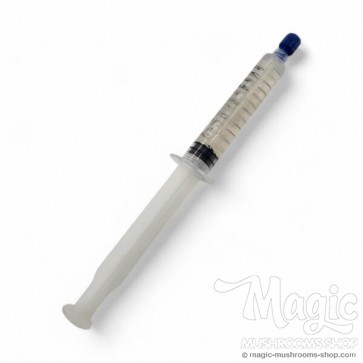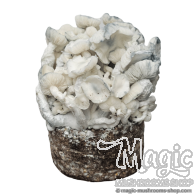Yeti liquid culture syringe
Discover the extraordinary Yeti strain - a true albino Psilocybe cubensis variety that represents the pinnacle of mycological innovation. With its icey white appearance, exceptional potency, and unique growth characteristics, this remarkable isolate from the True Albino Teacher lineage offers researchers an unparalleled opportunity to study one of nature’s most fascinating genetic expressions. The Yeti’s thick, meaty stems and distinctive blue-tinted hues, combined with its challenging spore production patterns, make it a prized specimen for serious mycological research and collection.
Availability: In stock
Experience the mystical power of one of the most unique and potent Psilocybe cubensis strains ever developed with our Yeti liquid culture syringe. This extraordinary true albino variety represents the pinnacle of mycological innovation, offering researchers an opportunity to work with genetics that defy conventional expectations.
Strain History and Origin
Originally developed by renowned mycologist Jik Fibs, the Yeti represents an isolated mutation of the True Albino Teacher (TAT) strain, which itself descended from the legendary Golden Teacher variety.
Jik Fibs first encountered this remarkable genetic expression when working with Albino Golden Teacher specimens around 2018-2019. Unlike typical breeding programs that require multiple crossbreeding steps, the Yeti emerged as a spontaneous mutation that caught the mycologist’s attention due to its unusually thick stems and peculiar growth patterns. What began as an experimental observation quickly evolved into one of the most prized genetic isolations in the Psilocybe cubensis community.
The stabilization process was remarkably swift compared to other strains, with the Yeti achieving genetic consistency within just a few generations. This natural stability, combined with its distinctive characteristics, established the Yeti as a cornerstone variety within the True Albino Teacher family tree, joining other notable isolates like Blue Ghost and Jack Frost.
Distinctive Characteristics
The Yeti strain stands as a true testament to the diversity possible within Psilocybe cubensis genetics, exhibiting several characteristics that distinguish it from other cubensis varieties.
True Albino Nature
Unlike many so-called “albino” strains that are actually leucistic (partially pigmented), the Yeti represents a genuine albino mutation. This complete absence of melanin production affects not only the fruiting body but extends to the spores themselves, which appear nearly transparent or completely clear. This distinction places the Yeti among the rarest categories of Psilocybe cubensis strains, as true albinism in fungi is considerably less common than leucistic variations.
Morphological Features
Yeti mushrooms present a striking visual profile that immediately sets them apart from standard cubensis varieties. The strain produces thick, substantial stems with a distinctly meaty texture, often displaying subtle blue-tinged hues that intensify upon bruising due to the high concentration of psilocybin and psilocin. The caps maintain a creamy white to pale bluish coloration and exhibit a unique growth pattern where they rarely fully open, maintaining a somewhat closed, bulbous appearance reminiscent of Penis Envy morphology but with distinct Yeti characteristics.
The overall size of Yeti specimens tends to be impressive, particularly from second and subsequent flushes, with the strain earning recognition as potentially the largest fruiting variety within the True Albino Teacher lineage.
Spore Production Characteristics
One of the most distinctive aspects of the Yeti strain lies in its spore production patterns. The strain exhibits remarkably low spore output compared to typical cubensis varieties, with caps that often fail to open completely, significantly limiting natural spore dispersal. This characteristic necessitates alternative collection methods, typically requiring swabbing techniques rather than traditional spore printing for genetic preservation. The spores that are produced appear transparent or nearly invisible, creating additional challenges for cultivators but also contributing to the strain’s mystique and rarity.
Growth Characteristics
The Yeti strain presents both opportunities and challenges for cultivation, requiring a nuanced understanding of its specific requirements and growth patterns.
Cultivation Difficulty
While sources vary in their assessment of the Yeti’s cultivation difficulty, the consensus suggests it falls somewhere between beginner and intermediate levels. Some cultivators report the strain as resilient and suitable for beginners due to its contamination resistance, while others note its slower growth patterns and higher maintenance requirements compared to standard cubensis varieties. This apparent contradiction likely reflects the strain’s forgiving nature regarding environmental variations while requiring patience due to extended colonization periods.
Environmental Requirements
Yeti mushrooms demonstrate adaptability to standard Psilocybe cubensis growing conditions while benefiting from specific environmental considerations. The strain thrives in temperatures ranging from 24-27°C (75-80°F) during colonization, with slightly cooler conditions of 15-21°C (60-70°F) preferred during fruiting phases. Humidity requirements align with typical cubensis needs, maintaining 80-90% relative humidity throughout most of the growth cycle.
Interestingly, some cultivators suggest that maintaining complete darkness throughout the growth cycle may enhance the strain’s potency, though this remains a subject of ongoing experimentation within the growing community.
Substrate Preferences
The Yeti strain demonstrates excellent compatibility with standard cubensis substrates, showing particular success with millet, brown rice flour, and coconut coir mixtures. Many growers report success with pre-sterilized grain bags and standard mushroom growing kits, making the strain accessible to researchers with varying levels of experience.
Growth Timeline
One of the defining characteristics of Yeti cultivation is its extended timeline compared to faster-growing cubensis strains. The colonization phase typically requires additional patience, with some cultivators comparing its growth rate to Penis Envy varieties. However, this slower initial development often results in more substantial yields and larger individual specimens, particularly in subsequent flushes.
Key Features and Potency
The Yeti strain has earned recognition for several key features that position it among the most sought-after Psilocybe cubensis varieties for research purposes.
Exceptional Potency
Laboratory analysis of Yeti specimens reveals consistently high psilocybin and psilocin concentrations, with samples averaging approximately 0.88% psilocybin and 0.13% psilocin, totaling around 1.14% combined tryptamines. The strongest samples submitted for testing have reached 1.56% total tryptamines, representing nearly 50% higher potency than average cubensis strains. This places the Yeti among the most potent naturally occurring cubensis varieties, even surpassing its parent strain, True Albino Teacher, which averages 0.87% total tryptamines.
Research Applications
The Yeti strain offers unique research opportunities due to its distinctive genetic profile and consistent characteristics. Its true albino nature provides researchers with specimens exhibiting complete melanin absence, allowing for studies on pigmentation genetics in fungi. The strain’s low spore production and transparent spore characteristics present interesting subjects for research into fungal reproduction mechanisms and spore development patterns.
Collection and Preservation Challenges
The strain’s low spore production creates unique preservation challenges that make it particularly valuable for research collections. Traditional spore printing methods prove largely ineffective, requiring specialized swabbing techniques for genetic material collection. This characteristic contributes to the strain’s rarity and makes liquid culture preservation methods particularly valuable for maintaining viable genetics.
| Productcode | LCS.C920-PSCU-YETI |
|---|---|
| Weight (KG) | 0.0500 |
| Form | Culture Syringe |
| Contents (ml) | 10ml |
| Mushroom Strain | Yeti |
| Species | Psilocybe cubensis |
| Potency | High |
| Difficulty | Moderate |
| Origin | Isolation |






